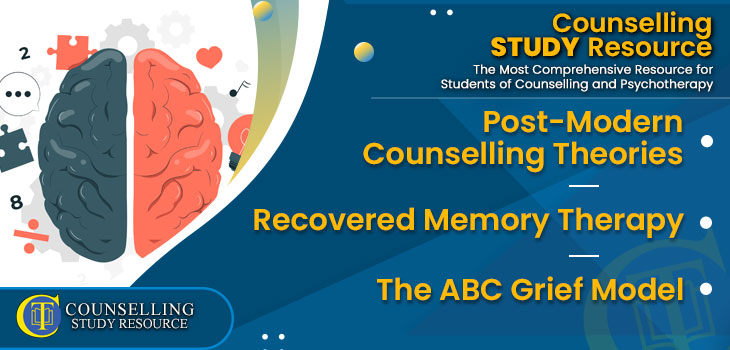268 – Recovered Memory Therapy
Post-Modern Counselling Theories – The ABC Grief Model
NOTE: The Counselling Tutor Podcast is a free resource, which is available on the main Counselling Tutor website. We also place it in CSR for your ease of access. Unlike our other CSR resources, podcast episodes may include presenters’ opinions, and are not intended to be referenced for academic use.
In Episode 268 of the Counselling Tutor Podcast, your hosts, Rory Lees-Oakes and Ken Kelly bring us this week’s three topics:
- Firstly with ‘Theory in Practice’, we look at what is post-modern counselling and its theories.
- Then in ‘Practice Today’, listen as Rory and Ken discuss recovered memory therapy.
- And lastly in ‘Practice Matters’, Rory speaks with Mandy Gosling about the ABC grief model.
Post-Modern Counselling Theories [starts at 02:25 mins]
Counselling Foundations is sponsored by
Counselling Skills Academy
Learn counselling techniques by seeing counselling skills used in real sessions by qualified therapists.
Real sessions - real-life presentations - real skills.
For anyone that hasn’t previously looked at post-modern counselling theories, it can be difficult to grasp straight away. Listen as Rory and Ken have a discussion about the beliefs and approaches that make up post-modern counselling:
- The post-modern method of counselling focuses on solution-focused and narrative-focused ways of working with a client:
- Solution – helping clients to find and work towards solutions rather than looking into the past.
- Narrative – encourages the client to build their own stories and reconstruct their sense of selves.
- For post-modern counselling, there isn’t any real sense of any personality theory.
- A departure from traditional ideas.
- Deconstruction – thinking about how we believe ourselves to be and how we got there, creating our own truths.
- Not referencing what has come before.
- Disproving biases held before.
- Asking fundamental questions – is what I believe true, or it something I've always been told?
- Moves away from a fixed idea of personality.
- Constructing a reality between you and the client and seeing how you can move forwards.
A handout on Postmodern Therapy Primer is available for download in the green button above.
Recovered Memory Therapy [starts at 17:20 mins]
In this section, Rory and Ken discuss recovered memory therapy, and some of the conversations that surround its use with clients:
- Therapist input – there is a chance these memories could be fabricated based on words said, or suggestions made, by the therapist.
- Implanted false memories.
- Recovered memory therapy is linked with hypnosis – a state where someone is more susceptible to suggestion.
- Sometimes traumatic memories can be locked/hidden away from us, but there is more often than not at least vague detail still in memory e.g. the build up to, or the aftermath of, the traumatic event.
- EMDR – use of timelines. By putting what happens in a timeline, you can unscramble memories and help the client make more sense of events that took place; however, this deals with things the client knows, and the memories they already have.
- Tread lightly with clients who believe they have repressed memories – they are vulnerable to suggestion.
- The difference between implicit and explicit memories.
- Look for things that are tangible – even if these memories are just in snapshots.
ABC Grief Model [starts at 34:37 mins]
The National Counselling Society is proud to sponsor Practice Matters.
NCS are really excited to have launched their Children and Young People Therapist Register for counsellors working with the younger age group.
In this week’s ‘Practice Matters’, Rory speaks with Mandy Gosling about the ABC grief model.
The key points of this discussion include:
- Some people don’t realise their difficulties are being caused as a result of their unresolved childhood grief.
- It can influence a person’s relationship with other people, their self-esteem, and possibly their career.
- It could be the cause of feelings of anxiety, e.g. health anxiety.
- The counselling should be carried out in a gentle and paced way – going straight to the grief could traumatise the client. Bring it into the conversation using gentle questioning.
- Second generation unresolved childhood grief – can result in under/over parenting and therefore show its effects in the next generation.
- Highlighting how it manifests and the effects and influences – showing the client why they have these feelings and help them to understand it is a normal response.
- Long-term work – it’s important to be gentle as you are quite often working with a child in an adult’s body. The client’s developmental stage was disrupted/ruptured, resulting in a child suspended in time.
- You're reintegrating the person whilst also tackling the grief.


